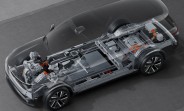Huawei Luxeed R7 EREV confirmed by government filing
One of the most recent additions to Huawei's growing portfolio of electrified vehicles to capture our attention is the Luxeed R7. It's an SUV coupe developed in a collaboration between Huawei and Chery that was initially launched as an all-electric car. Now, the latest MIIT filing confirms the R7 is getting an extended-range electric vehicle (EREV) version.
The EREV Luxeed R7 claims an all-electric range of 121 miles or 125 miles, depending on the version. This difference likely stems from the wheel size, with the 125 miles range version likely sporting 20-inch wheels and the 121 miles range version equipped with 21-inch wheels. The EREV version gets its electric power from a 36 kWh lithium iron phosphate battery pack supplied by CATL, and weighing in at 639 lb.

For longer journeys, the R7 EREV uses a range extender in the form of a 1.5l engine, delivering 115 kW of power. This engine, also found in the Exeed Exlantix ET, allows the R7 EREV to achieve a fuel consumption figure of 5.68 liters per 100 km (41.5 mpg). We expect that the EREV version will mirror the Exeed Exlantix ET's setup with a 195 kW electric motor on the rear axle.
In terms of dimensions, the EREV version matches its all-electric counterpart, measuring 195.1 inches in length, 78 inches in width, and 64.3 inches in height, with a wheelbase of 116.1 inches. Built on the E0X modular architecture platform, the R7 EREV has a sleek design with a drag coefficient of Cd 0.219, contributing to its top speed of 124 mph.

Higher-spec versions of the R7 EREV come equipped with Lidar and use the Huawei Qiankun ADS 3.0 system for advanced autonomous driving capabilities. Models without Lidar still benefit from the standard version of the system, with high-speed autonomous driving and intelligent parking features.
The all-electric Luxeed R7 is currently priced between RMB 259,800 and RMB 339,800 ($35,800 - $46,800). The official pricing for the EREV version hasn't been released yet, but it's expected to have a lower starting price, which should make it an easier option on the wallet for those looking to enter the EV market.
Reader comments
- shawman123
- jZ4
Difference between EREV and PHEV is that gasoline engine works just as a generator to charge the battery in EREV. So the electric motors just run off the battery. PHEV the electric motor can run through battery and gas engine.




Facebook
Twitter
Instagram
RSS
Settings
Log in I forgot my password Sign up